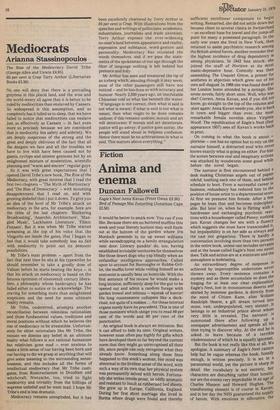Mediocrats
Arianna Stassinopoulos
The Rise of the Mediocracy David Tribe (George Allen and Unwin £4.95) 95 per cent is Crap Terry Arthur (Libertarian Books £3.50) No one will deny that there is a prevailing greyness in this placid land, and the wise and the world-weary all agree that it is better to be ruled by mediocrities than enslaved by Caesars. So widespread is this assumption, and so completely has it lulled us to sleep, that we have failed to notice that mediocrities can enslave just as effectively as Caesars — in fact even more so precisely because we are convinced that in mediocrity lies safety and sobriety. We are deeply suspicious of the strong and the great and deeply oblivious of the fact that all the dangers we face and all the troubles we have to live with have been caused not by giants, cyclops and sinister geniuses but by an enlightened mixture of moderation, scientific planning and "warm and sincere" regular guys.
So it was with great expectations that I opened David Tribe's new book, The Rise of the Mediocracy, with great interest that I read the first two chapters — The Myth of Meritocracy' and 'The Rise of Democracy' — with mounting disappointment that I read on, and with growing disbelief that I put it down. To give you an idea of the level of Mr Tribe's attack on mediocracy in the arts, for example, here are the titles of the last chapters: 'Blathering Broadcasting', 'Anarchic Architecture', 'Mangled Music', 'Lacklustre Literature', 'Filmic Flotsam'. But it was when Mr Tribe started screaming at the top of his voice that the Visigoths are inside the gates, that I began to feel that it would take somebody less au fait with mediocrity to point out its demonic possibilities.
Mr Tribe's main problem — apart from the fact that next time he sits at his typewriter he should remember to take a goodly dose of Valium before he starts beating the keys — is that his attack on mediocracy is based on the fatuous optimism of nineteenth century liberalism, a philosophy whose bankruptcy he has failed either to notice or to acknowledge. The craving for something more than enlightened scepticism and the need for some ultimate reality remains,
Mr Tribe, undeterred, attempts another reconciliation between relentless rationalism and those fundamental values, traditions and moral positions without which he believes the rise of mediocracy to be irresistible. Unfortunately for elitist rationalists like Mr Tribe, the minute we dismiss any belief in an ultimate reality what follows is not rational humanism but relativism gone mad — ever anxious to make a little sense of our having been born and our having to die we grasp at anything that will give some meaning to the surrounding senselessness, and this includes all the forms of intellectual mediocracy that Mr Tribe casti.gates, from Rosicrucianism to Druidism and witchcraft. Nietzsche, too, tried to fight mediocrity and triviality from the hilltops of supreme unbelief and he went mad. I hope Mr Tribe's end is less dramatic. been excellently chartered by Terry Arthur in 95 per cent is Crap. With illustrations from the speeches and writings of politicians, academics, industrialists, journalists and trade unionists, Terry Arthur exposes the ever-widening no-man's-land between appearance and reality, expression and substance, word-gesture and personality. Mediocracy has etiolated the words themselves, and if we pass the statements of the spokesman of our age through the filter of language nothing is left behind but pretence and folly.
Mr Arthur has seen and measured the tip of an iceberg which, amazing though it may seem, most of the other passengers still have not noticed — and he has done so with accuracy and humour. Nearly 2,500 years ago, an inscrutable Chinaman told us what lies beneath the water: "If language is not correct, then what is said is not what is meant; if what is said is not what is meant, then what ought to be done remains undone; if this remains undone, morals and art will deteriorate; if morals and art deteriorate, justice will go astray; if justice goes astray, the people will stand about in helpless confusion. Hence there must be no arbitrariness in what is said. This matters above everything."


























 Previous page
Previous page